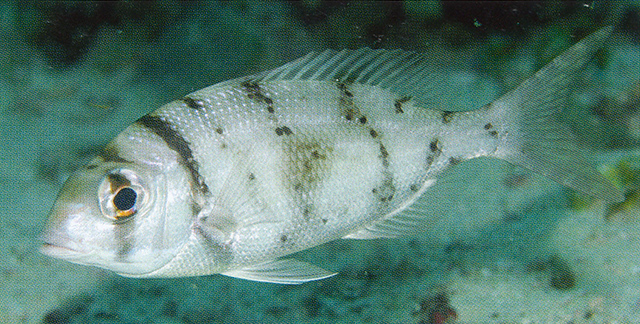
|
Gymnocranius griseus (Temminck & Schlegel, 1843) Grey large-eye bream |
||
Grey large-eye bream Porgy, Bag-angan, Bukawing gulat, Bulao, Hunas balo, Kalumbal, Katambak, Katambak, Lawsuh, Parepare, Petilya, Putotan, |
||

|
|
photo by
Allen, G.R. |
| Family: | Lethrinidae (Emperors or scavengers), subfamily: Monotaxinae | |||
| Max. size: | 35 cm TL (male/unsexed) | |||
| Environment: | reef-associated; depth range 15 - 80 m, non-migratory | |||
| Distribution: | Indo-West Pacific: southern Japan to the Indo-Malaysian region, probably eastward to India. Has often been confused w/ the young of Gymnocranius grandoculis, hence its distributional limits are somewhat obscure. Records of Gymnocranius griseus from the Western Indian Ocean probably pertain to Gymnocranius grandoculis. | |||
| Diagnosis: | Dorsal spines (total): 10-10; Dorsal soft rays (total): 9-10; Anal spines: 3-3; Anal soft rays: 9-10. Description: Eye diameter is relatively large, its diameter about equal to or slightly larger than preorbital and interorbital width. Overall color is silvery, frequently with a diffuse vivid pattern of 5 to 8 narrow dark bars on the side, including one through the eye and across the cheek. Fins are mainly clear to yellowish; sometimes there is diffuse mottling or spotting on dorsal, caudal and anal fins. Often there is a narrow brown bar across the base of the pectoral fins. Some adults possess a few scattered blue spots or scribbling on the snout and cheek (Ref. 2295). Relatively ovoid body and pointed caudal lobes are distinct (Ref. 37816). Body depth 1.9-2.3 in SL (Ref. 90102). | |||
| Biology: | In sheltered coastal bays and sand and mud slopes in depths over 20 m (Ref. 48635); also in coastal trawling grounds. Juveniles sometimes in shallow estuaries on algae reefs (Ref. 48635). Sometimes forms schools. Feeds on bottom-living invertebrates. Sexually mature upon reaching 15-17 cm SL. Sometimes caught with handlines and marketed dried (Ref. 9775) or fresh. In Hong Kong live fish markets (Ref. 27253). | |||
| IUCN Red List Status: | (Ref. 96402) | |||
| Threat to humans: | harmless | |||
| Country info: | Also Ref. 48613. | |||
| Entered by: Luna, Susan M. - 10.11.90 |
| Modified by: Olisa, Kristine Elaine Paz - 12.05.16 |
| Checked by: Garilao, Cristina V. - 18.08.94 |